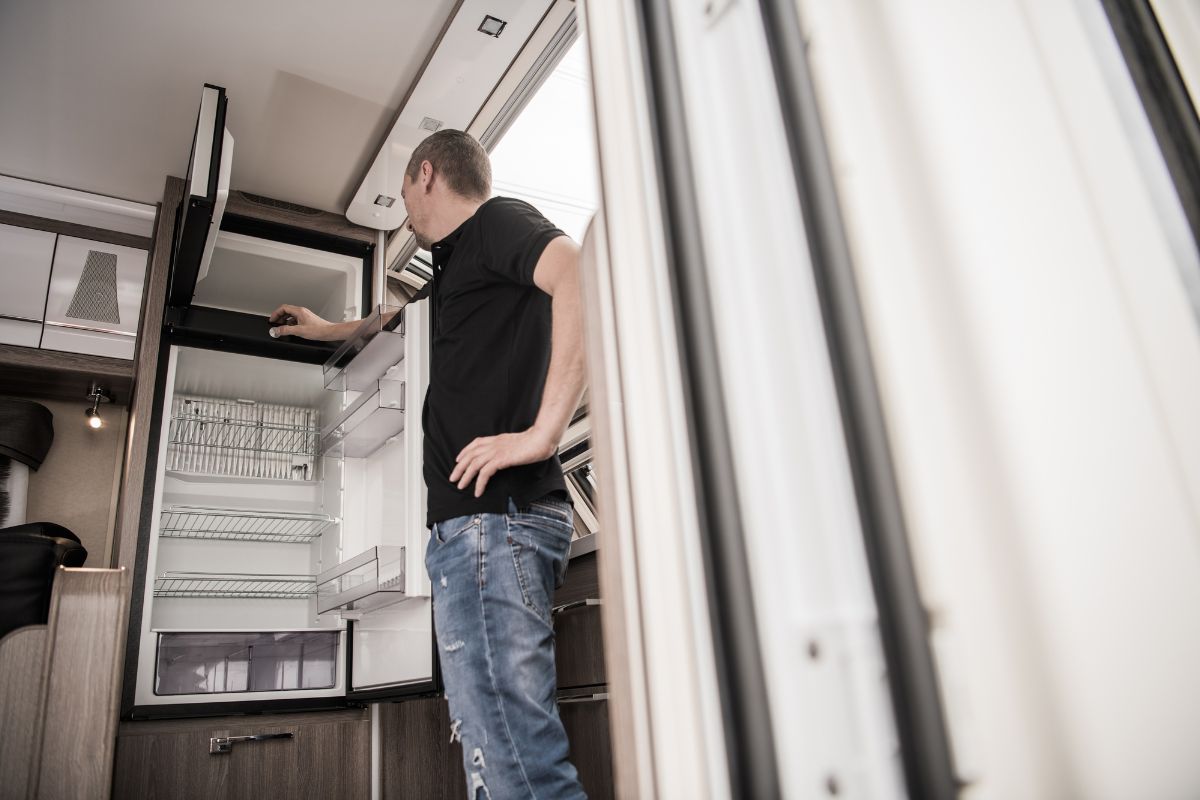Discover How To Use The Power of Authority Marketing To Make You Money While You Adventure!
No Experience, Existing Product Or Technical Skills Are Required
DO YOU BELIEVE ADVENTURES ARE WORTH CHASING?
We're an affiliate.
We hope you love the products/services we recommend on Just Van Life! So you know, there is the possibility we will collect a commission should you make a purchase via any of our links. This will in no way affect the purchase price. Thank you for your support, we really appreciate it!
If you want to go boondocking and have to keep all your perishable items in your RV fridge you’ll need to use propane. But how much propane does an RV fridge use, and how can you make it work more efficiently?
We take a look at how RV fridges work, how much propane they use and how to make sure they are operating optimally.
How Does An RV Fridge Work?
An RV fridge that runs on propane operates an absorption system. This is different to the way the refrigerator in your kitchen runs, that appliance uses compressed freon to cool the inside of the fridge.
However an RV fridge uses a blend of ammonia, hydrogen and water to produce a powerful evaporation effect. It involves the solution being heated by either a propane flame or an electric element.
A vaporization interaction occurs between the liquid ammonia and hydrogen gas and this extracts heat from the interior of the fridge.
Calculating The Amount Of Propane An RV Fridge Will Use
While you don’t need to know exactly how the whole process works it is good to have a basic understanding. When you are off grid the use of propane to cool your fridge will reduce the electric drain on the onboard generator or 12 volt battery.
There are many things that will contribute to the amount of propane that your RV fridge will use. The age of your RV will determine how efficient your fridge is and the size of the fridge will dictate how much propane is needed to keep it running.
A 10-12 cubic foot refrigerator will typically use 1 ½ pounds of propane a day which translates to approximately 1,400 BTUs every hour. For a slightly smaller fridge of 8 cubic feet one gallon of propane will be enough to run your fridge for 61 hours or 2 ½ days.
A typical 20 pound propane tank holds just over 4 ½ gallons of propane. This size of tank will last you for 11 days with an 8 cubic foot fridge.
How To Make Your RV Fridge More Efficient
Of course there are ways that you can make your RV fridge more efficient and therefore reduce the amount of propane that you are using. By employing some of these tips and tricks you can save money on propane and extend the life of your RV fridge.
Regular Maintenance
As with any appliance regular maintenance is essential to keep it in good working condition and help it to run smoothly. Routine checks can also flag up any potential problems before they have a chance to impact on the running of your RV fridge.
You should look out for leaks, rust or other signs of corrosion. A build up of soot around the propane exhaust vent could be a sign of inefficient combustion and should be addressed.
Keep Everything Level
It is important to keep the fridge level as absorption systems work best when they are on a level surface. This is mainly due to the gravity fed operation of the fluids in the cooling system.
The RV should be parked on level ground too as this will impact the fluids in the fridge’s system and slow down the internal fluid cycling process.
If the fridge is kept in an unlevel position for a long period of time it will operate inefficiently and can develop mechanical faults. This can lead to fires inside the RV.
Run The Fridge Before Loading It

Absorption refrigerators take a while to reach a good temperature, so you should get the fridge up and running four to six hours before you load any of your food.
When you do start to load your fridge, put the cold items in first. This can further reduce the thermal load on your RV fridge. If you have the room, putting ice packs on each shelf can help to drive the temperature down even more.
Don’t Block The Back
As an RV fridge works on a heat exchange process the appliance needs to vent heat energy out the back. If the vent is blocked or the fridge is too close to the RV wall then there may not be enough air circulation to allow proper operation of the fridge.
Newer refrigerators may have different requirements so check what the minimum distance is between the rear of the fridge and the wall.
Help Air To Circulate
Unlike home refrigerators an RV fridge won’t come with a built-in circulation fan. So to help with air circulation you can install a special fan to the fridge’s evaporator fins which will evenly distribute the cold air throughout the fridge.
Adjust Temperature
If the temperature outside is cold then you can reduce the temperature in your RV fridge. This is because the fridge in your RV is more directly affected by the outside temperature than the refrigerator in your home.
Using Coolers To Augment RV Fridge
When you are planning a longer trip for maybe a week or more you may not be able to get all your food into your RV fridge. Even if you did manage to pack it all in this would significantly reduce the airflow inside the fridge and make the system work inefficiently.
Using high quality coolers to augment storage for your perishable items will reduce the work that your fridge has to do. By keeping everyday items in a cooler you will also cut down on the number of times that you need to open the fridge and let cold air out.
Ice packs rather than ice cubes are more practical for coolers but if you can only get bags of ice cubes while you are on the road, don’t break them open. Instead leave them intact and lay them on top of the food in the cooler.
Final Thoughts
We hope that this guide to how much propane an RV fridge uses has been helpful and informative for you.
Discover How To Use The Power of Authority Marketing To Make You Money While You Adventure!
No Experience, Existing Product Or Technical Skills Are Required
DO YOU BELIEVE ADVENTURES ARE WORTH CHASING?
